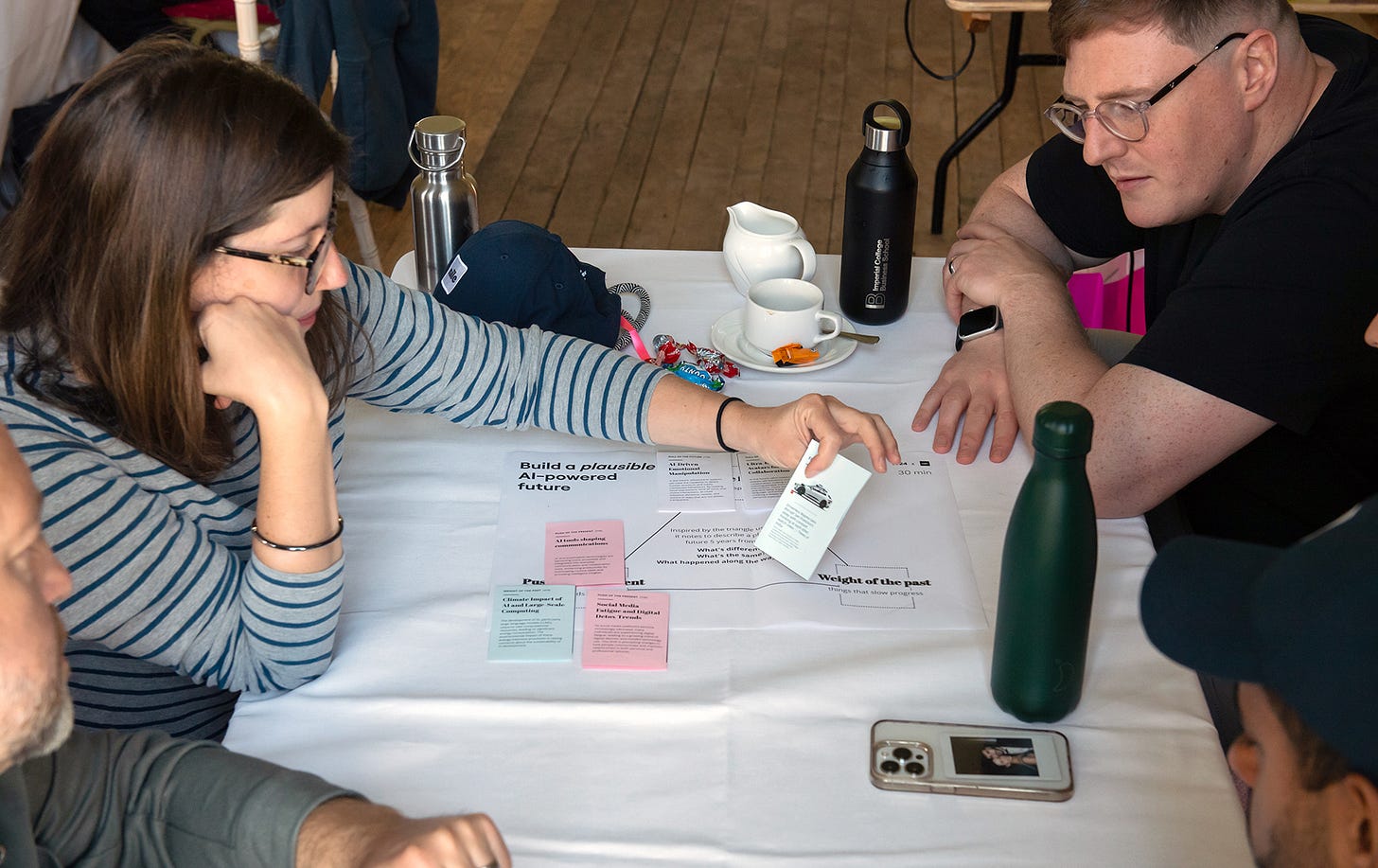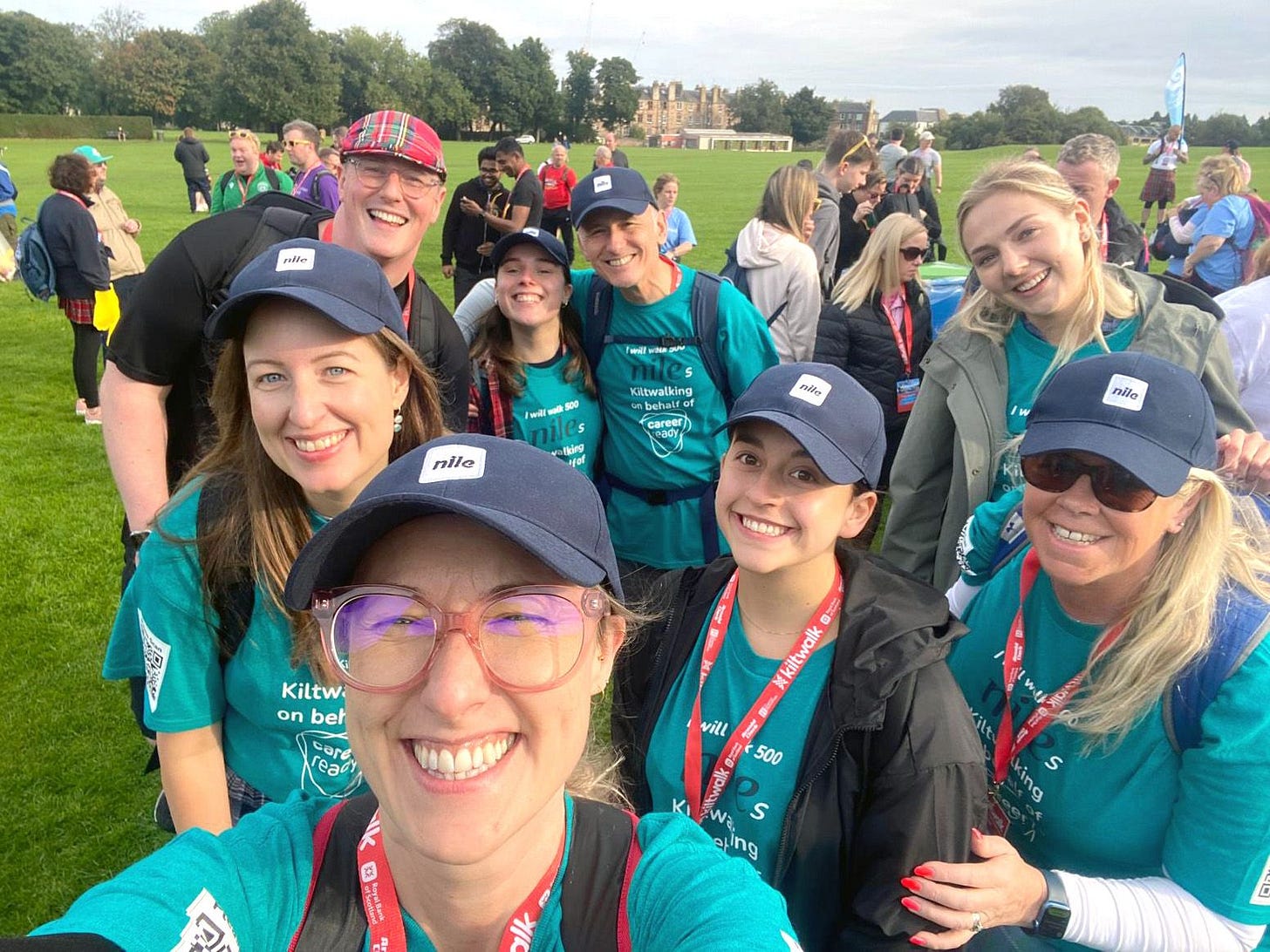Field notes from the front lines of AI delivery 🌾
Some ideas on how to make your AI work a success - because everyone's still figuring this stuff out.
Welcome to The Navigator 🧭 - a newsletter about people, technology and design for business leaders who want to make meaningful change. I’m Sarah Ronald, and I write this newsletter with the Nile team. If this email was forwarded to you, you can subscribe here to receive it straight to your inbox.
Hello! 👋
AI is a game-changer, but everyone’s still figuring it out. Like any transformative technology, implementing AI work raises unexpected challenges – especially since the best practices and frameworks we can lean on in other fields aren’t quite there yet.
To remedy that, this month we’re sharing some of the most useful lessons we’ve learned while delivering AI work for our clients.
Sticking with AI, if you’re in financial services, you won’t want to miss our next webinar. We spoke to FS customers to understand their beliefs, attitudes and behaviours around AI. Find out what they said – and what it means for those designing FS products and services – scroll down to find out more.
Wishing you all the best as you navigate your week.
– Sarah
Principles and practices for making a success of AI implementation
AI is exciting, and it’s right to be excited about it. But it’s also new to most of us, so it can be hard to think about what hurdles might come about during an AI implementation, and how to overcome them.
Good news! At Nile, we’re already implementing AI work for our clients. Here, we’ll share some lessons we’ve picked up along the way.
Be realistic about what you can achieve with your resources
There can be a disconnect between what you’re told AI can achieve versus the reality of what can be implemented.
AI evangelists, whether from service providers or within your business, tend to overpromise the impact and ease-of-use of AI without fully understanding the complexities of a real-world implementation. This front-loads your project with unrealistic expectations and an initial jolt of enthusiasm, which inevitably creates frustration and disillusionment when building the thing turns out to be far more complicated and involved than anyone thought.
Since AI is still in the early days of adoption, there’s a lack of standardised methods, best practices, and governance frameworks to lean on. Different organisations - and even different departments - are using AI in different ways, meaning approaches are fragmented and inconsistent. This is creating confusion and inefficiency when trying to scale AI projects, especially within larger enterprises.
AI platforms add their own challenges
The current AI landscape is unstable. It's less an arms race and more the wild west: with new features being developed and released all the time, the ground is shifting so quickly that even the big platforms struggle to provide reliable roadmaps. It can feel like they’re making it up as they go along.
For those of us trying to implement products built on those platforms, it makes things challenging and unpredictable in ways that can have a serious impact. Models and infrastructure can change without warning: in one case, our team received a notification that the OpenAI model we were building our AI product on would change within a week, which was naturally rather disruptive (and not the good kind of disruptive). For longer-term projects, this kind of volatility creates additional challenges for planning, product development, and resource allocation that get in the way of delivery.
Equally problematic are the platforms' pricing models, which can be utterly unintuitive and really inconsistent. There are massive price jumps for scaling services - in one case, the price leaps from £100 to £30,000 per month - with no clear articulation from vendors as to what additional features justify the increase. This makes budgeting harder to predict, forcing us as project leaders to make unclear financial commitments when integrating AI at scale.
This is all very new, but that doesn’t mean you can’t make it a success
In short, we're all navigating uncharted territory with AI. For programme leaders, strategic designers and product managers who are keen to experiment and implement AI proofs-of-concept, we have to be adaptable, manage expectations very carefully, and be prepared for significant changes throughout the lifecycle of an AI project.
Based on our experience of delivering AI projects for our clients, we’ve come up with some principles and practices that could help you overcome the challenges:
Prepare senior management for the long-haul.
Senior management must be willing and committed to investing long-term in AI without a quick return. In fact, it might take years and several budget cycles before the investment is recouped.Multiply everything by five (at least).
Assume everything will be five times harder, five times more complicated, five times more expensive, and take five times longer than you think.Get a strong sponsor.
Many organisations have far too much red tape to engage in AI experimentation and implementation. Find yourself a strong, highly-engaged sponsor who can shift blockers to progress and get stuff done.Be strict about only testing suitable use cases.
Don’t use AI frivolously. Identify tight use cases that are easy to measure and quantify – ones that would provide immense value if delivered to some degree.Once proven, think about organisational scale.
At some point, your group IT or Data team will want to centralise what you’ve been doing, to help it scale and ensure good governance. Plan for this and welcome it when it comes – it means you’re doing something right.Build a lean A-team and process.
Create a lean team from the outset – it’s better than figuring out that your team and board management processes are too bloated further down the line. Think about potential issues like having the right talent available, language barriers, and cultural norms (such as deference).Insist on Agile.
With so many unknowns, dependencies and moving parts outside your control, it just isn’t possible to deliver a great AI project without an Agile way of working. Your approach must be open to serious, continuous scope change.Design principles still apply.
We’re not at the singularity just yet. AI is still ‘just another new technology’, albeit one with huge potential. So while we wait for Artificial General Intelligence to happen, design thinking, doing and user-centred approaches are more important than ever.
Most of all, if you’re approaching a project involving AI or any new technology, it’s important to have expertise you can rely on to get the job done in a way that’s focused on creating the right outcomes for people.
Our team is actively delivering well-informed, well-adopted and sustainable AI work. If you’d like to talk to us about your own AI ambitions, drop us a line.
Nile News
Customer experience and AI – join our webinar
Join us on Thursday 3rd October as we reveal the results of new research into financial services customer attitudes to AI, and what it means for financial sector products and services.
Everyone’s excited about AI… right? Not quite. We spoke to real financial services customers, and what they told us paints a more nuanced picture than the hype would suggest.
In this webinar, we’ll share the real barriers to customer adoption that AI-enabled products present. Crucially, we’ll also explain how taking a human-centred approach can help you overcome them, building confidence and creating positive outcomes for customers and for your bottom line.
You will hear key insights from the research, followed by a panel discussion featuring experts working directly on AI product implementation and the challenges of human interaction with these solutions.
Joining us will be…
Neil Collman, Design Director, Nile
Dr Alexa Haynes, Head of Research, Nile
Sam Netherwood, Co-founder and Director, Tomoro.ai
Jakub Wujek, AI Programme Owner, STX Next
Reserve your place at the webinar now
Mighty Striders raise £3,000 for young people
Thanks to the generous support of our clients, partners and friends, we’ve raised more than £3,000 as part of this year’s Edinburgh Kiltwalk.
Our intrepid team "I Will Walk 500 Niles" successfully completed the Mighty Stride – 21.3 miles. We’re donating the money raised to Career Ready, a charity which gives young people the help they need to build successful careers.
There's still time to make a difference – if you'd like to find out more and support this brilliant cause head over to our fundraising page.
See some more pics from the day over on our Instagram.
If you find The Navigator valuable, please spread the word by sharing it with your friends and colleagues:
About Nile
We’re a strategic design company that delivers human-centred change in highly regulated industries. Here’s three ways we can help:
Strategic projects - We’ll help you de-risk outcomes, saving time and money without compromising experience.
Accessibility - We can help you get accessibility right, as a fundamental part of inclusion.
Talent - Supercharge your internal change efforts with our Trusted Talent service – long-term placements of expert people who’ll help you deliver key transformation and BAU outcomes.
If you’d like to know more, just reply directly to this email (they come straight to my inbox), or reach out to someone specific via our website.
Thanks for reading! 🚀








